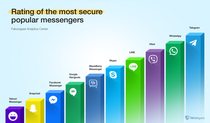Top 7 reasons for employee dismissal in 2012
Experts of the analytical department of the Falcongaze Company summarized the annual survey on the most popular reasons for employee dismissal in 2012. This study as usual was based on the data collected by the SecureTower system, designed for information leakage protection and employee monitoring in the workplace. This time the company's specialists decided to not only find out the reasons for dismissals but also to figure which of them were the most popular in various business areas.
As in 2011, in 2012 the most popular reason for dismissals was the improper use of time and the Internet. This cause not only retained the leading position, but also strengthened it. According to Falcongaze analysts' estimates 34% of dismissals in 2012 were related to the employee reluctance to fulfill their professional duties. Social networks, overreliance reading of news feeds, gossip columns and the yellow press as well as online shopping, games, chat in instant messengers with family and friends, watching cinematic masterpieces and frivolous movies – all these things became an essential and even predominant part of working days for many employees. Clearly, such practice is totally unacceptable for employers. It's one thing when an employee is briefly distracted to bring their thoughts in order and quite another when an employee is paid wages literally for their own amusement.
Due to the misuse of working time most often leaders fired the employees of travel agencies, banks and information technology organizations. The study found that in the tourism industry employees spent a considerable amount of time visiting social networks while the percentage of such visits in banks was much lower. This is largely due to the fact that in many banks access to social networks is closed. Thus, employees of the bank, apparently trying to compensate ban on social networking sites most frequently viewed news sites.
Situation with the employees of IT companies was marked by another trend. Many workers were trying to derive double benefit from their work, doing their freelance projects during working hours. It follows that employers actually had to pay not for the performance of tasks for the good of a company but for the time that an employee spent on working for the other people.
Second position, as in 2011, was occupied by the discussion of managers and policies of the company (19%). As they say, don’t bite the hand that feeds you. Well, if there is something you don’t like in your company, the best decision is to use constructive criticism and settle all disputes. If this method for some reason doesn’t work, the Solomon solution will be to find a company complying with your principles and views.
It became clear in the course of the study the largest number of layoffs due to the sharp criticism of the management as well as the company itself was in retail organizations and large industrial companies.
"The Bronze Medal" in the list of reasons for dismissal in 2012 took the search for a new job. There is nothing bad in desire to change job, but we should not forget that the search for a new place to apply our knowledge should not be carried out literally at the expense of the current employer. Drafting and sending out resumes is time-consuming while the motivation of the employee who has decided to leave the company is significantly reduced, which has a negative impact on their performance. In addition, employees who leave the organization tend to take with them client databases, strategic projects and other types of information which have considerable value. It is not surprising that 13% of executives prefer to dismiss their employees before they put on the table their voluntary resignation letter. The highest amount of dismissals for that reason was revealed in the organizations involved in trade as well as the telecommunications industry, which are characterized by rather high staff turnover.
In comparison with 2011, in 2012 the number of employees who were laid off for bribes decreased. Thus, greed and selfish motives which overpowered employees were the reason for 11% of dismissals. Office abuse also falls into this category. Unfortunately, situations when employees seek to derive from their position material benefit or try to "bring" to the company anyone from their family and friends whose professionalism and competence are poor are not uncommon.
Another reason for dismissal was the careless handling of sensitive data. It happens that the employees involved in running considerable amount of tasks send emails with confidential information to the wrong email address. No one can be absolutely safe from such situations but if these cases are becoming systematic, then the probability of corporate information disclosure increases significantly. Thus, in 2012, 10% of employees were dismissed because of their own carelessness. Most "heads in the clouds" were punished in the financial sector, as well as in logistic and retail companies, where data protection is given special attention.
Regular delays, work absenteeism, tactless behavior with clients and colleagues – all these can be named with a single term: the violation of corporate rules. 8% of employees were dismissed for this reason. Most scrupulously to the issues of labor regulations this year reacted in the service sector, banking sector, as well as in insurance companies. Obviously, dismissal for delay was not the most popular reason; however, such oversights tend to be the last straw in the issue of dismissal of an employee who made a serious mistake.
The list of the strongest reasons for dismissal in 2012 would not be complete without a situation when employees deliberately disclosed confidential information, while having quite mercantile interests. 5% of staff were convicted of the desire to share the projects of the company with competitors and then fired. Most often on the sale of confidential information to the competitors were caught the employees of industrial, commercial and IT companies.
The data presented above indicate that, as in 2011, laid-off employees were deprived of their seats for well-founded reasons. Another thing is that a manager can’t always determine the seriousness of misconduct of their subordinates in the right way. So it would be nice when making such decisions to have a special tool which would help to assess the situation objectively. As they say, measure twice and cut once, and the signature in the order of dismissal is a couple of seconds matter.







.png)





